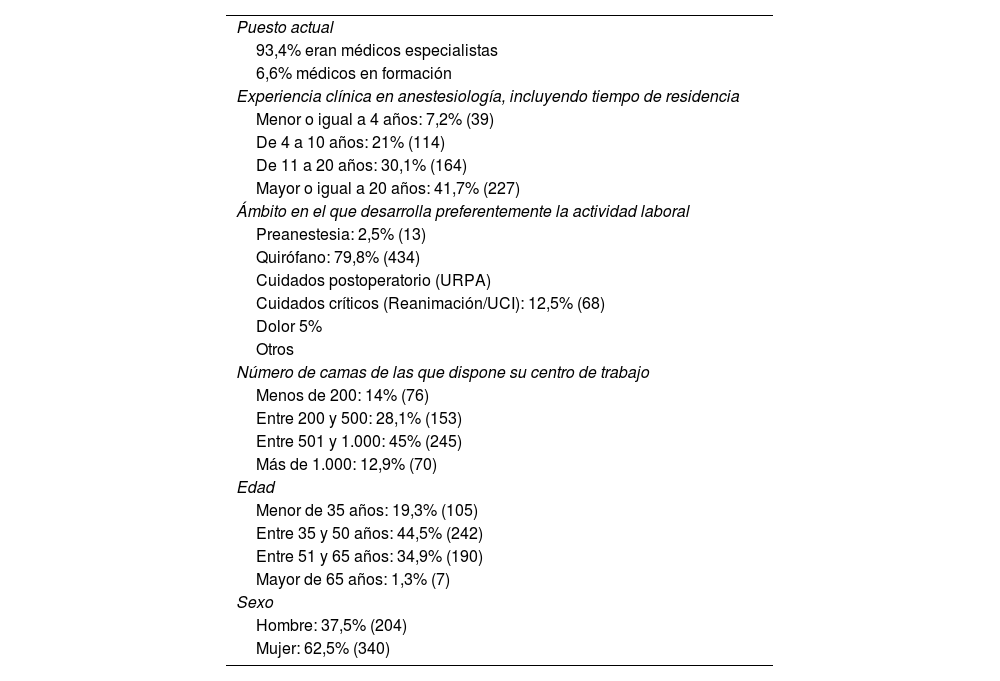La disfunción cognitiva perioperatoria es un síndrome clínico muy prevalente debido al progresivo envejecimiento de la población quirúrgica. El objetivo de nuestro estudio es evaluar la práctica clínica de los anestesiólogos españoles encuestados respecto a esta entidad.
Material y métodosEncuesta online prospectiva realizada por la Sección de Neurociencias y distribuida por la Sociedad Española de Anestesiología, Reanimación y Terapéutica del Dolor.
ResultadosSe obtuvieron 544 respuestas, con una participación del 17%. Del total de los encuestados, el 54,4% no hace nunca una valoración preoperatoria del deterioro cognitivo, solo el 7,5% la realiza siempre. El 79,6% carece de protocolo de manejo intraoperatorio del paciente en riesgo de DCP. En la planificación anestésica, solo un 23,3% tenía en cuenta el DCP. El 89% considera la anestesia regional con o sin sedación preferible a la anestesia general para prevenir el DCP. Un 88,8% opina que las benzodiacepinas presentan un alto riesgo de DCP. Por otro lado, un 71,7% cree que la monitorización de la profundidad anestésica podría prevenir el déficit cognitivo postoperatorio. La evaluación rutinaria del delirium postoperatorio (DPO) es baja, solo un 14% la efectúa. Más del 80% reconoce que el DCP está infradiagnosticado.
ConclusionesEntre los anestesiólogos españoles encuestados, la DCP es aún una entidad poco conocida y valorada. Es necesario concientizar sobre la necesidad de detectar los factores de riesgo de DCP y la evaluación posoperatoria. Por ello, se sugiere el desarrollo de guías y protocolos, así como la implementación de programas de formación continuada en los que los anestesiólogos deberían ser miembros clave de equipos multidisciplinares encargados de la atención perioperatoria.
Perioperative cognitive dysfunction (PCD) is a very prevalent clinical syndrome due to the progressive aging of the surgical population. The aim of our study is to evaluate the clinical practice of Spanish anesthesiologists surveyed regarding this entity.
Material and methodsProspective online survey conducted by the Neurosciences Section and distributed by SEDAR.
Results544 responses were obtained, with a participation rate of 17%. 54.4% of respondents never make a preoperative assessment of cognitive impairment, only 7.5% always do it. 79.6% lack an intraoperative management protocol for the patient at risk of PCD. In the anesthetic planning, only 23.3% of the patients was kept in mind. Eighty-nine percent considered regional anesthesia with or without sedation preferable to general anesthesia for the prevention of PCD. 88.8% considered benzodiazepines to present a high risk of PCD. 71.7% considered that anesthetic depth monitoring could prevent postoperative cognitive deficit. Routine evaluation of postoperative delirium is low, only 14%. More than 80% recognize that PCD is underdiagnosed.
ConclusionsAmong Spanish anesthesiologists surveyed, PCD is still a little known and underappreciated entity. It is necessary to raise awareness of the need to detect risk factors for PCD, as well as postoperative assessment and diagnosis. Therefore, the development of guidelines and protocols and the implementation of continuing education programs in which anesthesiologists should be key members of multidisciplinary teams in charge of perioperative care are suggested.















